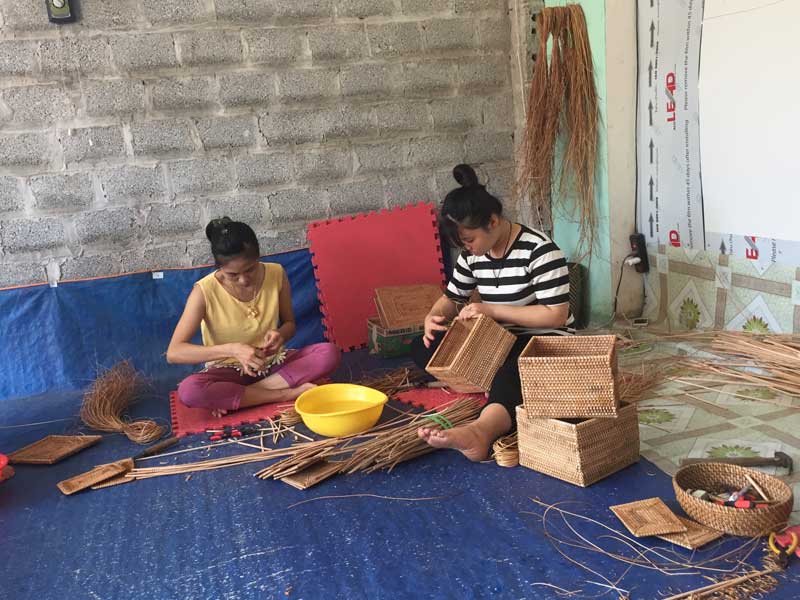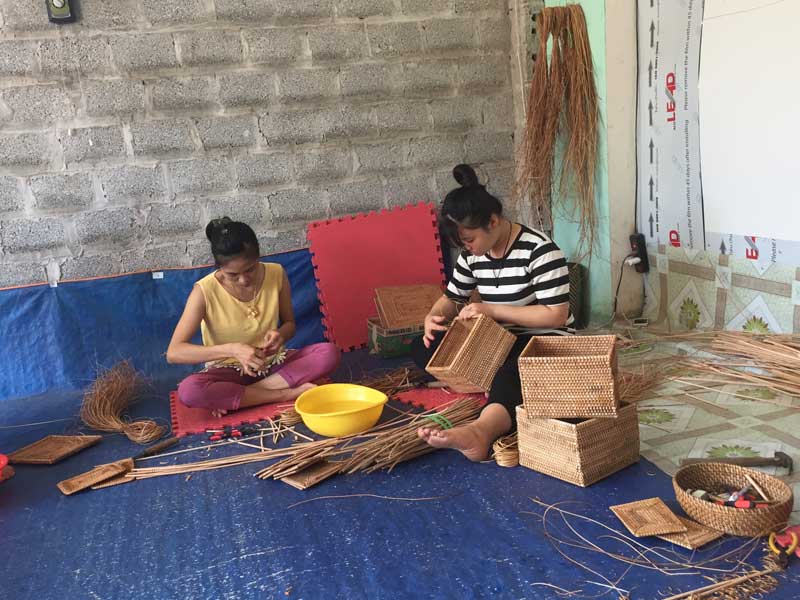
(HBO) – The household of Ms. Bui Thi Vinh, in Zone 1, Hang Tram town is the typical example in the emulation movement of good production and business among farmers in Yen Thuy district. From the model of fruit trees planting combined with breeding cows, her family has a stable income of 600-700 million VND per year.

The production model of rattan and bamboo
knitting of Mr. Vuong Van Tuan (Ha village, Phu Lai commune)
Ms. Bui Thi Nga, the Chairman of
Farmers Association of Yen Thuy district confirmed: Up to now, hundreds of
excellent production and business examples have emerged with the movement for
farmers to emulate good production and business, collaborating to help each
other to enrich and reduce poverty in the area. Green grapefruit, red
grapefruit, safe vegetables or raising cattle, goats, mountainous chickens,
local pigs become the main crops and livestock to bring prosperity to the
households. The areas developing mountainous chickens raising, local pigs,
goats and cow husbandry are Lac Thinh, Phu Lai and Huu Loi communes. The
average income of typical farmer households is 500-600 million VND a year,
there are households still reaching nearly 1 billion VND per year. In addition,
the model of planting red grapefruits and green grapefruits are focused in the
communes of Lac Hung, Lac Luong and Hang Tram town, which brings high economic
efficiency. In which, there are typical farmer households such as Mr. Ta Huy
Hau - Zone 2, Hang Tram Town; Mr. Vu Xuan Oanh - Dai Dong village, Ngoc Luong
commune, etc.
With the motto of "Do not stop
innovating in the direction" and "Considering the grassroots as the
field of operation", all levels of Yen Thuy District Farmers' Associations
has made positive efforts in organizing the implementation. As a result, the
movement became more and more formal, developing in both breadth and depth.
During the period of 2012 - 2018, over 25,800 households already registered to
be members, of which the number of households achieving good productionand
business levels at all levels accounts for nearly 50% of the total registered
households. In 2017, there are 3,621 households in the district achieved good
results, of which 6 are at the State level, 122 are at the provincial level,
768 are at the district level and 2,707 are at the grassroots level.
According to data from the Hoa Binh Provincial Party Committee, the industrial production index for the first six months of 2025 is estimated to have increased by 20% compared to the same period last year. This marks the highest year-on-year growth rate for this period since 2020.
In the first six months of 2025, Hoa Binh province’s export turnover was estimated at 1.145 billion USD, marking an 18.11% increase compared to the same period in 2024. Import turnover was estimated at $ 804 million, a 17.15% increase, which helped the province maintain a positive trade balance.
The lives of the ethnic minority farmers in Tan Lac district have gradually improved thanks to the new directions in agricultural production. This is a testament to the collective strength fostered through the professional associations and groups implemented by various levels of the district’s Farmers’ Union.
With the motto the "product quality comes first,” after nearly one year of establishment and operation, Muong village’s Clean Food Agricultural and Commercial Cooperative, located in Cau Hamlet, Hung Son Commune (Kim Boi district), has launched reputable, high-quality agricultural products to the market that are well-received by consumers. The products such as Muong village’s pork sausage, salt-cured chicken, and salt-cured pork hocks have gradually carved out a place in the market and they are on the path to obtaining the OCOP certification.
In the past, the phrase "bumper harvest, rock-bottom prices" was a familiar refrain for Vietnamese farmers engaged in fragmented, small-scale agriculture. But today, a new spirit is emerging across rural areas of Hoa Binh province - one of collaboration, organisation, and collective economic models that provide a stable foundation for production.
Maintaining growing area codes and packing facility codes in accordance with regulations is a mandatory requirement for agricultural products to be eligible for export. Recently, the Department of Agriculture and Environment of Hoa Binh province has intensified technical supervision of designated farming areas and packing facilities to safeguard the "green passport" that enables its products to access international markets.



